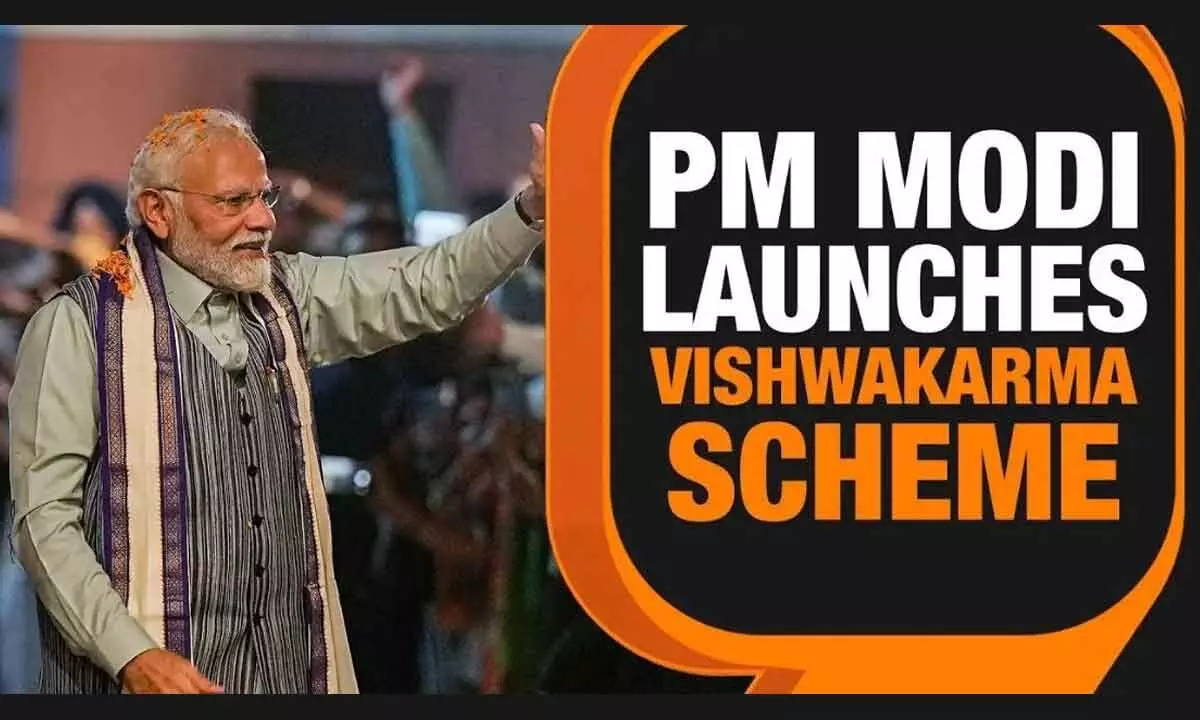PM should monitor implementation of Vishwakarma scheme across all parameters
A major boost to artisans and craftspeople from the country’s rural and urban areas
image for illustrative purpose

Spare a thought for the cobbler, plumber, barber, coir weaver, traditional toy maker, garland maker, washerman, and the likes, who all have been serving us since long. Did you notice that despite serving the society for so many years and decades, they live a very difficult and precarious life with nothing to fall back upon?
However, now there is a ray of hope for them with Prime Minister Narendra Modi launching the ‘PM Vishwakarma scheme’ on September 17, especially to support artisans and workers.
After giving the green signal to the scheme, Modi met a cobbler and others to know about their trade. Thanks to this ambitious scheme, beneficiaries will get ₹15,000 each as toolkit incentives and collateral free enterprise development loans at concessional rates of interest.
Naturally, the scheme aims to improve the quality, scale and reach of products and services available to artisans by exposing them to better and accessible raw material, tools and training on product development. The beneficiaries will be integrated with international and domestic value chains by providing marketing, packaging and branding assistance as well as access to markets.
It is a fact that life is not easy for all those who are covered under the Vishwakarma scheme.
Take the case of Raju, a cobbler from Delhi. He has to bear the brunt of the scorching sun and wait for customers from early in the morning till 9 pm to earn his livelihood. It is equally dreadful when it rains heavily. His earnings hardly cross Rs 300 a day with which he has to fend his family.
If luck eludes him, he may have to be content with just Rs 100 on some days. With the cost of living soaring rapidly, his wife tries to run the family within whatever her husband earns. Although the family is struggling to meet both ends, the couple never thought of discontinuing its children's education. They have three children including two daughters, with the eldest son just having completed class 12. One hopes that the Vishwakarma scheme would change their lives for the better.
It goes without saying that the primary goals of the program is to improve the quality and reach of artisans’ and expect a wider market for their products and services, as well as to integrate them into domestic and international value chains.
Agreed, the government is keen on improving the state of those live on the edge of our society. Towards this, it is duty-bound to implement the scheme in letter and spirit.
However, we have noticed that several government schemes fail to get implemented in a proper way. Those who should be benefitted from the schemes do not get their due. The real beneficiaries have faced many problems in availing it. This is a huge matter of concern.
You would know that the Modi government has launched various schemes and policies such as ‘Digital India’ and ‘Atal Pension Yojana’. Despite the presence of developmental schemes, India is far behind in creating a harmonious and truly prosperous society. There are allegations that the Midday Meal scheme has failed in many states due to subversion of funds, as what was served was low on both quality and quantity.
Meanwhile, it said that under the new scheme, artisans and craftspeople will be provided recognition through PM Vishwakarma certificate and ID card along with a credit support of up to ₹ one lakh (in the first tranche) and ₹ two lakh (second tranche) with a concessional interest rate of five per cent. The credit guarantee fees would be borne by the central government.
The artisans would have to go through a skill verification phase followed by a five-day training session. They would be provided an advanced training for 15 or more days, during which period they would get a stipend of ₹500 per day.
The scheme also has a corpus of ₹250 crore for quality certification, branding, advertising, publicity and other marketing activities. The scheme was approved by the cabinet committee on economic affairs (CCEA) on August 16 with an outlay of ₹13,000 crore for a period of five years (FY24-28).
The scheme will provide support to artisans and craftspeople of rural and urban areas across the country. Approximately, 18 traditional trades have been identified as initial beneficiary sectors.
They include carpenters, boat makers, blacksmiths, hammers and tool kit makers, locksmiths, goldsmiths, potters, sculptors, stone breakers, cobblers, shoe-smiths, masons, coir weavers, traditional toy makers, barbers, garland makers, washermen and tailors.
A senior central government official said that the eligibility requirements include a minimum age of 18 years and the applicants should not have availed loans under similar credit based self-employment schemes of central and state governments in the five preceding years.
If may be recalled that during his Independence Day speech, Modi had said that the government would roll out the scheme for traditional artists and craftspeople within a month. Following the announcement, the Union Cabinet quickly approved the initiative, indicating the government’s commitment to fostering and maintaining traditional skills and crafts.
The good thing is that the pro-active Uttar Pradesh government is gearing up to implement ‘PM Vishwakarma’ scheme on a large scale and efforts are being made to connect as many skilled persons with the scheme as possible. Finally, all those who have to implement the Vishwakarma scheme are duty-bound to implement it in letter and spirit. Any corruption in a scheme for the poor should not be tolerated.
(The author is Delhi-based senior journalist and writer. He is author of Gandhi's Delhi which has brought to the forth many hidden facts about Mahatma Gandhi)

